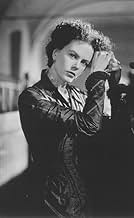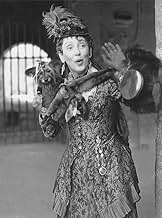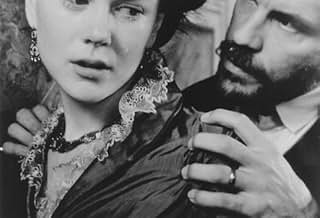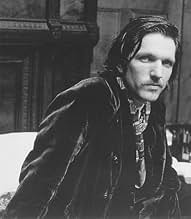An American girl inherits a fortune and falls into a misguided relationship with a gentleman confidence artist whose true nature, including a barbed and covetous disposition, turns her life ... Read allAn American girl inherits a fortune and falls into a misguided relationship with a gentleman confidence artist whose true nature, including a barbed and covetous disposition, turns her life into a nightmare.An American girl inherits a fortune and falls into a misguided relationship with a gentleman confidence artist whose true nature, including a barbed and covetous disposition, turns her life into a nightmare.
- Nominated for 2 Oscars
- 5 wins & 15 nominations total
Amy Lindsay
- Miss Molyneux #1
- (as Katie Campbell)
- Director
- Writers
- All cast & crew
- Production, box office & more at IMDbPro
6.213.4K
1
2
3
4
5
6
7
8
9
10
Featured reviews
Supporting Cast saves this Film
I have always enjoyed period pieces, good adaptations even more so. This film, however, is really only worth a 5 - an average film - if not for the strong performances of the supporting cast. The work of Barbara Hershey and Martin Donovan in particular is stellar, raising my rating to 6 on their merit alone.
Aside from those two, this film is an exercise in 'almosts' and 'not quites'. It is almost engaging enough, yet just short of drawing me completely in. It not quite makes me believe Nicole Kidman's Isabel is worthy of the love of so many. The love shown by the suitors is believable enough (again, a well acted supporting cast), I simply do not quite believe the object of that love would elicit it.
Still, the film is good. It is a pity, though. It could have been great.
Aside from those two, this film is an exercise in 'almosts' and 'not quites'. It is almost engaging enough, yet just short of drawing me completely in. It not quite makes me believe Nicole Kidman's Isabel is worthy of the love of so many. The love shown by the suitors is believable enough (again, a well acted supporting cast), I simply do not quite believe the object of that love would elicit it.
Still, the film is good. It is a pity, though. It could have been great.
A Brilliant Novel, A Mess of a Film
Henry James's "The Portrait of a Lady" stands as one of the greatest psychodramas in literature, a precise and coolheaded dissection of the evolution of a privileged, idealistic if slightly arrogant young woman. This work exemplifies so many qualities which distinguish his view of human nature; he is compassionate, empathetic and observant yet unyielding in exposing the follies, bad judgement and darkness inherent is his characters. No one, especially Isabel Archer, is let off the hook for their misguided choices and her fate is tragic yet completely plausible and, as laid out by James, completely compelling.
A lost opportunity is the best way to describe the film. It is interestingly photographed, full of greys, blues and whites and suggests an almost funereal solemnity in its production design and cinematography. And Nicole Kidman makes a perfect, iridescent Isabel Archer; she looks the part in every respect and certainly conveys the character's intelligence and poignant receptivity to the sights and people around her.
Would that the film had served her better; Jane Campion and the scriptwriter, Laura Jones, eviscerate James's novel but retaining the basic story and structure but put it through the meatgrinder of 90s feminist revisionism. It has been transmogrified into a simplistic tract of victimization and domestic violence, but in doing so Campion and Jones haven't managed to at least raise the story's entertainment value or even create a coherent narrative line for the audience to follow. Rather than present Isabel as a poignant, charismatic figure who unwittingly corrupts her life through bad choices and misguided idealism, the writer and director show us a woman who is victimized by a big bad Man who keeps her locked up in the house, abuses her and steals her money upon duping her into an unhappy marriage. In doing so, James's great work has been drained of its universality and dramatic impact. And while sexual exploitation and gender roles certainly play a part in sealing Isabel's fate in 19th century society, by ignoring the trenchant thematic notions of self determination and the risks of emotional idealism presented by James in his book, we are given a shallow, one-dimensional creation lacking in James's acid edge. Campion cheats a modern audience of discovering filmically a great and still-relevant work by a writer who dared to travel down the darker alleys of a more "civilized" age.
A lost opportunity is the best way to describe the film. It is interestingly photographed, full of greys, blues and whites and suggests an almost funereal solemnity in its production design and cinematography. And Nicole Kidman makes a perfect, iridescent Isabel Archer; she looks the part in every respect and certainly conveys the character's intelligence and poignant receptivity to the sights and people around her.
Would that the film had served her better; Jane Campion and the scriptwriter, Laura Jones, eviscerate James's novel but retaining the basic story and structure but put it through the meatgrinder of 90s feminist revisionism. It has been transmogrified into a simplistic tract of victimization and domestic violence, but in doing so Campion and Jones haven't managed to at least raise the story's entertainment value or even create a coherent narrative line for the audience to follow. Rather than present Isabel as a poignant, charismatic figure who unwittingly corrupts her life through bad choices and misguided idealism, the writer and director show us a woman who is victimized by a big bad Man who keeps her locked up in the house, abuses her and steals her money upon duping her into an unhappy marriage. In doing so, James's great work has been drained of its universality and dramatic impact. And while sexual exploitation and gender roles certainly play a part in sealing Isabel's fate in 19th century society, by ignoring the trenchant thematic notions of self determination and the risks of emotional idealism presented by James in his book, we are given a shallow, one-dimensional creation lacking in James's acid edge. Campion cheats a modern audience of discovering filmically a great and still-relevant work by a writer who dared to travel down the darker alleys of a more "civilized" age.
Incomplete Portrait
I vacillate between preferring films that do a simple thing extremely well (Muppet Movie) or those that shoot high and fail. This film is the latter.
Campion has allied her aspirations with `women's' perspectives; honorable and rich enough. And she selects material ripe with possibilities. Clearly she has a vision, presumably extracted from the author's, but she fails to get on top of it.
Part of the problem is the simplification of the book for the screenplay. We just don't get enough foundation for the travesty of person we witness. A large part of the problem is Ms Kidman. She simply doesn't have the depth to pull this off, though she wears the clothes well. We never really see her supposed extraordinary spirit, and never really see how she's trapped by that very same spirit. Malkovich doesn't help. Here, he's too one-dimensionally a schemer.
Campion knows better than to throw in so many irrelevant film-school angles as a substitute for narrative reflection. This film is worth seeing as a study in how a spirited film maker is seduced by that very spirit into the superficialities of style, so is trapped. The ambiguous ending is, I think, Campion's limbo. Let's hope she escapes for her sake as well as ours. We need that spirit.
Campion has allied her aspirations with `women's' perspectives; honorable and rich enough. And she selects material ripe with possibilities. Clearly she has a vision, presumably extracted from the author's, but she fails to get on top of it.
Part of the problem is the simplification of the book for the screenplay. We just don't get enough foundation for the travesty of person we witness. A large part of the problem is Ms Kidman. She simply doesn't have the depth to pull this off, though she wears the clothes well. We never really see her supposed extraordinary spirit, and never really see how she's trapped by that very same spirit. Malkovich doesn't help. Here, he's too one-dimensionally a schemer.
Campion knows better than to throw in so many irrelevant film-school angles as a substitute for narrative reflection. This film is worth seeing as a study in how a spirited film maker is seduced by that very spirit into the superficialities of style, so is trapped. The ambiguous ending is, I think, Campion's limbo. Let's hope she escapes for her sake as well as ours. We need that spirit.
A cool, enigmatic film, but stylish...
An interesting film with an undercurrent of sexual repression similar to that in Campion's other films. Nicole Kidman is excellent, given the material, though her transition from likeable, virtuous innocent to a cold and corrupted woman doesn't ring as true as it should--the three years glossed over with a subtitle isn't adequate to show the change. I blame this on the interpretation, direction, and/or editing rather than Kidman's performance, however. Malkovich is not as strong, and one wonders what any woman could see in him as a lover.
The ending is cold and unsettling. Most filmgoers prefer to know that their hero/heroine is "safe" at the end of the story. Here, who knows ?
Production values are good, and the film is quite stylish with interesting use of camera tilt, lighting, and angles. It's quite artsy. I am glad I saw the film, but acknowledge it's not likely to be everyone's cup of tea.
The ending is cold and unsettling. Most filmgoers prefer to know that their hero/heroine is "safe" at the end of the story. Here, who knows ?
Production values are good, and the film is quite stylish with interesting use of camera tilt, lighting, and angles. It's quite artsy. I am glad I saw the film, but acknowledge it's not likely to be everyone's cup of tea.
A woman is torn between independence and love in this feminist adaptation of Henry James' novel.
Many people could not warm up to this remarkable adaptation of Henry James' novel, A Portrait of a Lady. The dark, abusive themes and open ending are not part of typical costume drama fare, but both are true to Henry James' novel and to Jane Campion's vision.
Henry James originally wrote the novel in the 1880s. Intended as an exploration of what a woman might do if she were given independent means, James' book indicts women as being trapped by a weaker nature. Exploring the same material Campion's movie comes to a different conclusion.
The adaptation and direction are superb. The movie maintains the steady rhythm of doom that makes James' novel an enduring classic. There is no place where this is more evident in the film than in its lingering images. The camera holds on to the subject a moment longer than expected, making the viewer a little uncomfortable, and anticipating sudden disaster that never quite arrives. Ms. Campion directs this film like a horror film, which is exactly what it is.
The acting in this film is also convincing, from Nicole Kidman's paralyzed Isabel, to John Malkovich as a hypnotically terrifying pursuer. They are backed by a solid cast of major actors in minor roles, all adding to Isabel's complex societal tragedy.
Portrait of a Lady, particularly this film adaptation, is a remarkable example of how stories may stay the same, but their meanings change over time.
Related films include: Washington Square (1997), The House of Mirth (2000), The Buccaneers (1995)(mini).
Henry James originally wrote the novel in the 1880s. Intended as an exploration of what a woman might do if she were given independent means, James' book indicts women as being trapped by a weaker nature. Exploring the same material Campion's movie comes to a different conclusion.
The adaptation and direction are superb. The movie maintains the steady rhythm of doom that makes James' novel an enduring classic. There is no place where this is more evident in the film than in its lingering images. The camera holds on to the subject a moment longer than expected, making the viewer a little uncomfortable, and anticipating sudden disaster that never quite arrives. Ms. Campion directs this film like a horror film, which is exactly what it is.
The acting in this film is also convincing, from Nicole Kidman's paralyzed Isabel, to John Malkovich as a hypnotically terrifying pursuer. They are backed by a solid cast of major actors in minor roles, all adding to Isabel's complex societal tragedy.
Portrait of a Lady, particularly this film adaptation, is a remarkable example of how stories may stay the same, but their meanings change over time.
Related films include: Washington Square (1997), The House of Mirth (2000), The Buccaneers (1995)(mini).
Did you know
- TriviaNicole Kidman spent two weeks in bed after filming wrapped, diagnosed as suffering from "emotional stress".
- Goofs(at around 47 mins) A horse carriage is passing through the shot from right to left. The crew with dolly-cam and equipment is clearly visible.
- Quotes
Ralph Touchett: I love you but without hope.
- Crazy creditsJane Campion thanks her family, Colin, Alice and Richard, for their generous support, suggestions and encouragement during the making of this film.
- SoundtracksImpromptu in A Flat Major, Op 90 No. 4, D899
(1828)
Composed by Franz Schubert
Adapted for screen by Brian Lock
Performed by Jean-Yves Thibaudet (as Jean Yves Thibaudet)
Courtesy of Decca Records Company Ltd.
- How long is The Portrait of a Lady?Powered by Alexa
Details
- Release date
- Countries of origin
- Languages
- Also known as
- Bức Họa Chân Dung
- Filming locations
- Palazzo Pfanner, Lucca, Tuscany, Italy(Osmond's palace in Florence)
- Production companies
- See more company credits at IMDbPro
Box office
- Gross US & Canada
- $3,692,836
- Opening weekend US & Canada
- $107,819
- Dec 29, 1996
- Gross worldwide
- $3,692,836
- Runtime
- 2h 24m(144 min)
- Color
- Sound mix
- Aspect ratio
- 2.35 : 1
Contribute to this page
Suggest an edit or add missing content







































